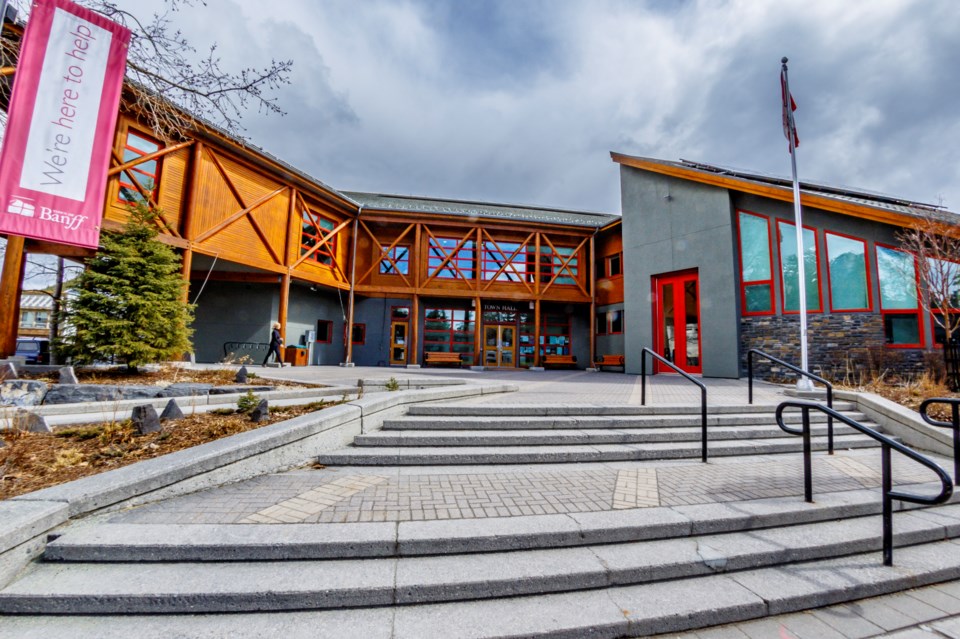BANFF – The Town of Banff’s draft operating budget proposes a 10.4 per cent municipal tax increase next year – and looks like it might jump higher as more services, programs and staffing positions are considered.
While testy at times, including a point of order called against Coun. Hugh Pettigrew for interrupting, the governance and finance committee began the annual service review and a budget process Monday (Dec. 4) and continuing into Wednesday (Dec. 6).
The proposed tax increase includes a five per cent inflationary increase next year to provide the current level of service, plus a 5.4 per cent hike for previously approved programs, projects and services. That’s before additional services are considered and a one per cent increase amounts to $200,300.
Town of Banff officials say total revenues are $66.3 million, with $25.2 million of that to be funded by property taxes and the balance coming from utility fees, business licences, visitor paid parking revenues and grants.
Chris Hughes, Banff’s corporate services director, said $23.7 million is dedicated to continuing with the same level of service in the municipality, while $1.2 million is to cover the cost of previously approved changes.
He said three per cent, or $700,000 of the $1.2 million, is specifically dedicated to refunding capital reserves that were diminished in 2020 in order to significantly reduce taxes during the height of the COVID-19 pandemic.
“In 2020, we cut municipal taxes by 17 per cent and a large part of that was a cut in our transfers to capital reserves,” he said.
“We are now paying for those cuts … so three per cent of that 5.4 per cent is just for increased transfers to capital reserves.”
At 10.4 per cent, the average residential home assessed at $467,100 would see a $9.84 monthly increase or $118 annual increase on their municipal tax bill.
As part of the draft operating budget, staff look set to get a 3.95 per cent wage adjustment next year, which is based on a blend of two indicators – the Conference Board of Canada’s growth outlook at 2.9 per cent and Alberta CPI of five per cent.
In addition, water rates are proposed to go up 5.8 per cent, sewer rates increase by five per cent and solid waste fees on average by 6.8 per cent.
“The utilities and fees and charges you will see at the next council meeting,” said Hughes.
Administration pitched three new positions for the Town to deliver the current levels of service – an accounting coordinator, heavy equipment technician and accounts payable administrator, which all have been tentatively approved by the governance and finance committee.
There are also several other projects, programs and services under consideration, including a finance intern, an emergency management coordinator, portable toilets at canoe docks, Bow Falls and Surprise Corner, and a gate or additional enforcement at the train station intercept parking lot.
Other pitches for council’s deliberations include increased Roam service, low-income transit pass expansion, carshare feasibility and pilot program, a lawn replacement incentive program, a climate change resiliency fund and a disc golf course.
Pettigrew repeatedly spoke of the need to watch spending, but did not make any motions to cut the operating budget at this stage.
Mayor Corrie DiManno was successful in her bid to have the $140,000 industrial compound area redevelopment plan slated for next year pushed back until 2025. This decision is not final until budget, though.
While still supportive of the project, particularly in terms of improving connectivity between the compound and townsite, the mayor said she was concerned about staff workload given council and the public are at the starting line of the process for the train station lands area redevelopment plan.
“I am concerned about capacity as it relates to being able to go and do this work,” she said.
“As well, I just think we could use the relief in our tax support that we need for 2024 and there is more flexibility in 2025.”
The committee recommended the 10-year capital plan for 2024-33 go to council for final consideration, which is expected to take place in January.
The long talked about columbarium and memorial garden project at the historic power station at the Old Banff Cemetery has been taken out, and $10,000 has been set aside to do further assessment work of the building.
Getting support only from Pettigrew, Coun. Ted Christensen was unsuccessful in his attempt to postpone all new proposed capital projects until 2026, such as multi-facility LED light upgrade, mobile highway sign, fencing repairs at Mountain View Cemetery and municipal enforcement AFRRCS radios.
Banff’s municipal taxes have increased about 20 per cent since 2019, but the average annual increase over the past five years is about four per cent.
Following the 17 per cent municipal tax cut in 2020, the tax increase was 12.4 per cent in 2021, 4.9 per cent in 2022, 11.1 per cent in 2023 and now proposed at 10.4 per cent for 2024.
Hughes said Banff residential taxes remain among the lowest compared to similar communities.
“In fact, next to Airdrie, Banff is the lowest in terms of residential taxes per capita,” said Hughes.




